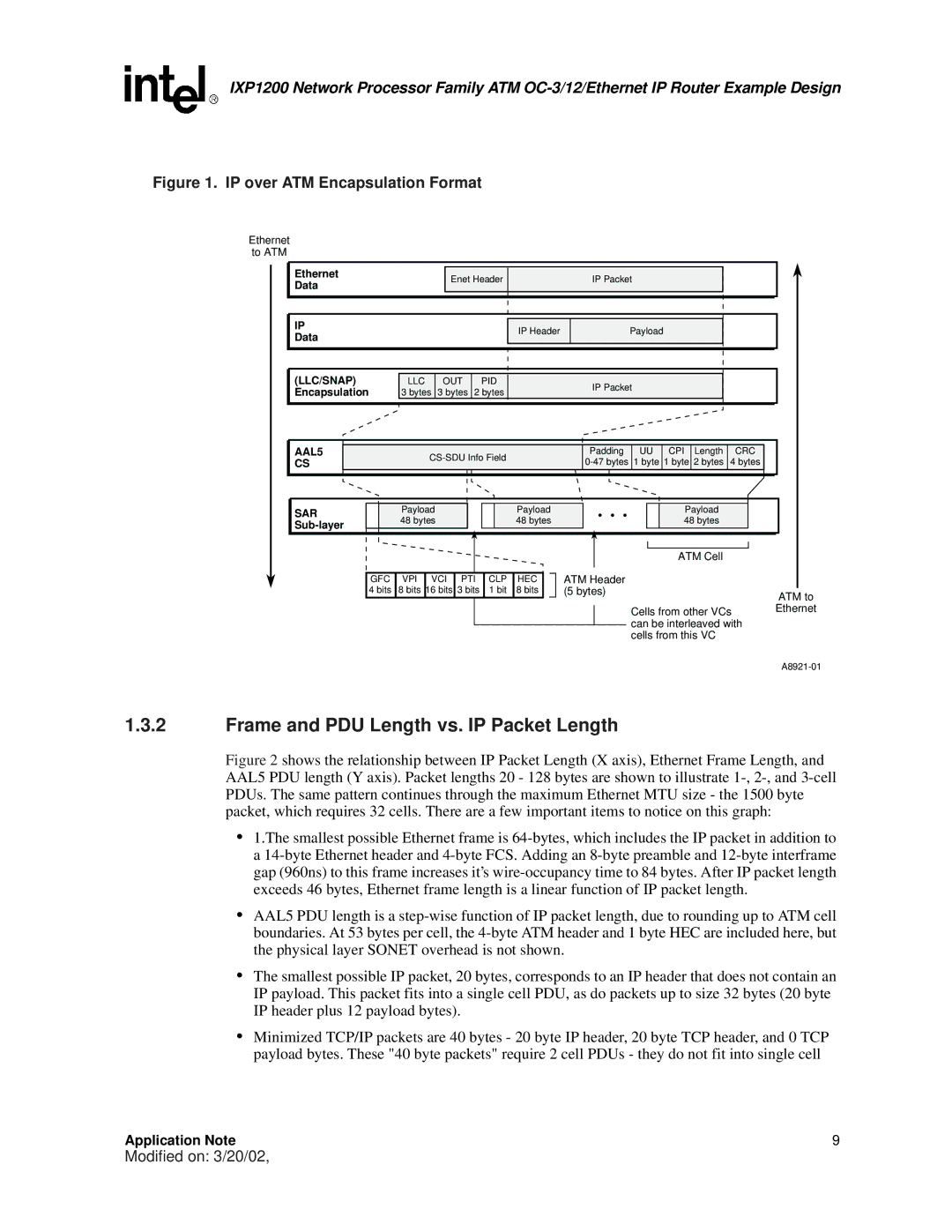
IXP1200 Network Processor Family ATM
Figure 1. IP over ATM Encapsulation Format
Ethernet
to ATM
Ethernet
Data
IP
Data
Enet Header |
| IP Packet |
|
|
|
|
|
|
| IP Header | Payload |
|
|
|
(LLC/SNAP) Encapsulation
LLC | OUT | PID |
3 bytes | 3 bytes | 2 bytes |
IP Packet
AAL5 | Padding | UU | CPI | Length | CRC | ||
CS | 1 byte 1 byte 2 bytes | 4 bytes | |||||
| |||||||
SAR |
|
| Payload |
|
|
|
| Payload |
|
|
|
|
| Payload | |||||
|
|
| 48 bytes |
|
|
|
| 48 bytes |
|
|
|
|
| 48 bytes | |||||
|
|
|
|
|
|
|
|
|
|
|
|
|
|
|
|
|
|
|
|
|
|
|
|
|
|
|
|
|
|
|
|
|
|
|
|
|
|
|
|
|
|
|
|
|
|
|
|
|
|
|
|
|
|
|
|
|
|
|
|
|
|
|
|
|
|
|
|
|
|
|
|
|
|
|
|
|
|
| ATM Cell |
|
|
|
|
|
|
|
|
|
|
|
|
|
| ||||||
|
|
|
|
|
|
|
|
|
|
|
|
|
| ATM | Header | ||||
| GFC | VPI | VCI | PTI | CLP | HEC |
|
| |||||||||||
| 4 bits | 8 bits | 16 bits | 3 bits | 1 bit | 8 bits |
|
| (5 bytes) | ||||||||||
Cells from other VCs can be interleaved with cells from this VC
ATM to
Ethernet
1.3.2Frame and PDU Length vs. IP Packet Length
Figure 2 shows the relationship between IP Packet Length (X axis), Ethernet Frame Length, and AAL5 PDU length (Y axis). Packet lengths 20 - 128 bytes are shown to illustrate 1-, 2-, and 3-cell PDUs. The same pattern continues through the maximum Ethernet MTU size - the 1500 byte packet, which requires 32 cells. There are a few important items to notice on this graph:
•1.The smallest possible Ethernet frame is 64-bytes, which includes the IP packet in addition to a 14-byte Ethernet header and 4-byte FCS. Adding an 8-byte preamble and 12-byte interframe gap (960ns) to this frame increases it’s wire-occupancy time to 84 bytes. After IP packet length exceeds 46 bytes, Ethernet frame length is a linear function of IP packet length.
•AAL5 PDU length is a step-wise function of IP packet length, due to rounding up to ATM cell boundaries. At 53 bytes per cell, the 4-byte ATM header and 1 byte HEC are included here, but the physical layer SONET overhead is not shown.
•The smallest possible IP packet, 20 bytes, corresponds to an IP header that does not contain an IP payload. This packet fits into a single cell PDU, as do packets up to size 32 bytes (20 byte IP header plus 12 payload bytes).
•Minimized TCP/IP packets are 40 bytes - 20 byte IP header, 20 byte TCP header, and 0 TCP payload bytes. These "40 byte packets" require 2 cell PDUs - they do not fit into single cell
Application Note | 9 |
Modified on: 3/20/02,
